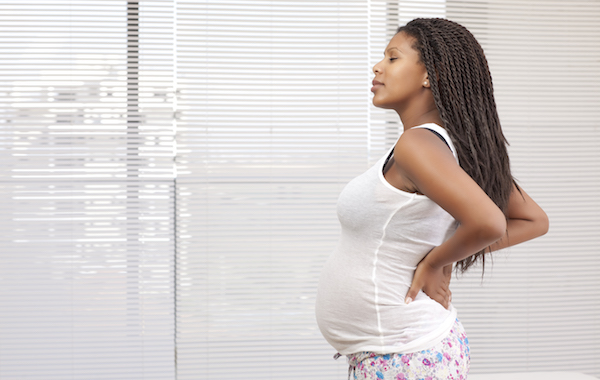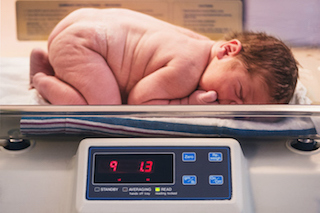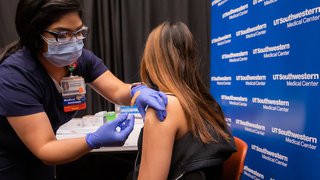COVID-19 and pregnancy: Answers to 10 key patient questions
March 17, 2020
This article was updated on Nov. 23, 2020, to include new information from a UT Southwestern study of COVID-19 and pregnancy.

Since the beginning of the global pandemic, we've received many questions from pregnant patients about the COVID-19 infection caused by the novel coronavirus, SARS-CoV-2. To date, the virus has infected millions across the world and continues to spread in the U.S.
Here's the good news for expectant moms:
In November, a UT Southwestern study showed that 95% of women who tested positive for COVID-19 during pregnancy had no adverse outcomes. Additionally, the study, published in JAMA Network Open, found that the virus was transmitted to the fetus in just 3% of the cases.
The bad news is that our findings also showed that approximately 5% of all delivered women with COVID-19 infection develop severe or critical illness. Five percent is a major concern, particularly when a pandemic is making its way through a population. However, that percentage is significantly lower than previous reports from the Centers for Disease Control and Prevention (CDC).
I expect we will continue to learn more about the risks during pregnancy as more data becomes available, but the bottom line is that most women with asymptomatic or mild infection will be relieved to know that their babies are unlikely to be affected by the virus.
In the meantime, you should follow published recommendations from reliable sources such as the American College of Obstetrics and Gynecology (ACOG) for advice related to pregnancy, labor and delivery, and the postpartum period to reduce risks to you and your baby.
While information about this particular viral infection and pregnancy is still emerging, we’d like to share what we do know and some recommendations.
Are COVID-19 symptoms similar during pregnancy?
SARS-CoV-2 is part of a family of viruses that cause illnesses ranging from the common cold to COVID-19 to severe acute respiratory syndrome (SARS), which was part of a global outbreak nearly two decades ago.
The majority of known cases of COVID-19 have been mild, according to data presented during a webinar delivered by the CDC's Clinician Access and Communication Activity (COCA) team. The World Health Organization (WHO) reported only 8% of pregnant women had serious disease, compared to 20% of the general population.
Symptoms during pregnancy are similar to those in the general public and can range from mild to severe. Symptoms of COVID-19 infection can include:
- Dry cough
- Sore throat
- Fever
- Diarrhea
- Fatigue
- Loss of taste and smell
- Shortness of breath
Symptoms typically appear within 2 to 14 days after infection. According to CDC, if you develop any of the following symptoms – trouble breathing; persistent pain or pressure in the chest; new confusion or inability to arouse; bluish lips or face – seek medical attention immediately.
Take a Virtual Tour of the Labor & Delivery Suites
As part of our COVID-19 emergency response, tours of the labor and delivery and postpartum areas at William P. Clements Jr. University Hospital have been suspended. This video provides of preview of the accommodations for new moms and their families.
Are pregnant women more at risk?
There is no evidence that pregnant women are more susceptible to COVID-19 infection than non-pregnant women in their same age range. Pregnant women face the same risks of infection from gatherings and group settings as nonpregnant women and should use masks, social distancing, and other recommended measures to prevent transmission. However, people often confuse risk of acquiring infection with risk of experiencing severe symptoms.
UT Southwestern's recent study, which followed 3,374 mothers at Parkland Health and Hospital System, 252 of whom had tested positive for the virus during pregnancy from March through August, showed that if you are an otherwise healthy pregnant woman you are not more likely to have a serious complication related to the infection. The overall risk of hospitalization among pregnant patients diagnosed with COVID-19 was similar to that reported in nonpregnant patients, at approximately 5%.
That said, we are typically more concerned about respiratory illnesses during pregnancy than in the general population. In the third trimester, a pregnant woman's lung capacity decreases 20% to 30% and her oxygen consumption increases by 20%. So, pregnant patients with respiratory infections potentially need more breathing support or supplemental oxygen than their nonpregnant peers.
That’s why we are diligent about vaccinating women against flu during pregnancy.

Can the virus be passed to my fetus?
A handful of studies have suggested that, in isolated cases, viral transmission of COVID-19 has occurred during pregnancy. One of those cases involved a patient who delivered under the care of physicians at UT Southwestern Medical Center.
In May, a patient was admitted to Parkland Memorial Hospital – she was going into labor six weeks early. Upon admission, she tested positive for COVID-19. She was previously unaware she had the virus.
Her baby was born and initially did well, although it was kept in the NICU in an area reserved for babies born to moms who had COVID-19 infections. After 24 hours, the newborn spiked a fever and showed signs of respiratory distress. The baby tested positive for COVID-19 at 24 and 48 hours, and tests for other infections were negative.
To determine whether the baby was infected in utero or during the birth process, doctors examined the placenta for the virus. Special testing showed the presence of virus in the placenta, which confirmed the baby had been infected before birth.
The baby was hospitalized for three weeks. Both mom and baby received oxygen therapy and fluids. Since then, both have recovered.
We know COVID-19 is a respiratory virus, which means it is transmitted through droplets from breathing, coughing, sneezing, and speaking. To get to the placenta, the virus would have to enter the mother's bloodstream and breach the placenta, which is possible but unlikely.
Very few cases of vertical transmission – in utero infection – have been reported. Horizontal infection (after delivery) is more plausible, but still relatively low at approximately 3%, according to UT Southwestern data.
So far, we have not seen an increase in babies born with congenital malformations associated with this virus like we see with rubella or Zika virus.
Though uncommon, we tell pregnant women to take all precautions to avoid catching the virus, including wearing a mask, washing your hands thoroughly, and avoiding situations where physical distancing is difficult.
How is COVID-19 diagnosed?
Initial screening is based on assessing patient symptoms, travel history, and exposure to others who are known to have the illness.
If testing is necessary, it consists of taking a nasal or oral swab. The test is designed to detect specific genetic material of the SARS-Co-A virus. Results come back at variable times, depending on the specific lab. Testing kits and options are becoming more accessible, which should reduce the turnaround time to get results.
Patients may also be tested for other illnesses with overlapping symptoms, such as the flu or strep. Data from the CDC webinar state that approximately 40% of patients with COVID-19 also had another respiratory infection.
What happens if I have the virus?
Pregnant patients with a mild case typically can monitor their condition at home. Symptoms can be treated with over-the-counter medications such as acetaminophen for fever and muscle aches and dextromethorphan for cough.
Stay in touch with your Ob/Gyn and seek medical care right away if symptoms worsen, particularly shortness of breath. Pregnant patients with severe symptoms, including low blood oxygen levels and pneumonia, will probably be admitted to the hospital for monitoring.
If you are admitted, you will be quarantined and, if possible, stay in a special room that is designed to reduce the risk of airborne spread of the virus. Visitors may be limited. Nurses and doctors will wear special gear that protects them from becoming infected, including a mask, eye protection, disposable gown, and gloves when they enter your room.
Related reading: 4 foods to ease cold and flu symptoms
Will having COVID-19 affect delivery and postpartum care?
Making sure you and your baby are safe is our top priority. Even if you have or are suspected of having a mild case of COVID-19 – or if you are asymptomatic but test positive upon admission to the hospital – when you go into labor, you’ll be isolated and nurses, doctors, and midwives will wear protective garb. Since the illness is spread by respiratory droplets, a C-section does not reduce the risk of infection in the newborn.
The previous recommendation was for newborns to be isolated from infected mothers for 14 days after delivery. Now the American Academy of Pediatrics says unless a mother who is infected with the COVID-19 virus is too ill to have her baby with her, rooming in with a baby is a reasonable choice, as long as you take precautions.
If the baby stays in the mother's room, the mother must wash her hands frequently and wear a face covering at all times when near her baby.
We also provide an in-room isolette, a clear, enclosed crib, which helps reduce a newborn's exposure to germs. Keeping babies with their mothers when it’s safe increases opportunities for bonding and breastfeeding. We also do not routinely test newborns whose mothers recovered from COVID-19 over a month before delivery unless the baby shows symptoms.

Should I breastfeed if I am infected?
That’s a complicated issue. Your breastmilk is best for the baby and may even contain antibodies that will help protect him or her from COVID-19.
However, the close contact during nursing may expose the baby to respiratory droplets from the mother. That’s led to the recommendation that infected mothers pump breast milk and then have a healthy caregiver bottle-feed the baby.
If a mom chooses to breastfeed directly, good hand hygiene before nursing and wearing a mask while breastfeeding is strongly recommended.
What other aspects of pregnancy care might change during the outbreak?
Many hospitals, including UT Southwestern, are limiting visitors to the nursery, patient rooms, and waiting areas. Your hospital might have other options for you to connect with family members who are excited to meet the baby, such as real-time video.
In-person prenatal classes and hospital tours may be postponed to reduce the risk of exposure. Ask your hospital about virtual tour options.
You might be asked not to bring additional companions with you to appointments to reduce infection risk in waiting areas.
If you are healthy and have no pregnancy complications, your prenatal visit schedule may change to accommodate other clinic or hospital needs and to reduce the possibility of exposure to a sick individual during a visit.
How can I reduce my risk?
Wearing a face covering over your nose and mouth in public at all times when physical distancing is not possible is the most impactful way to reduce your risk. Also,
Wash your hands regularly or use alcohol-based hand sanitizers. Wash for at least 20 seconds with soap and warm water before and after eating, touching public surfaces, or touching your eyes, mouth, or face. Teach your children about good hand hygiene, too.
Avoid crowds and minimize going out as much as possible.
What other preparations should I take?
- Stock up on a reasonable amount of groceries and home necessities. We do not expect major gaps in the supply chain for common household supplies. However, stocking up reduces the number of trips you must take to public places. Consider curbside service or home delivery to further reduce exposure.
- Get medical necessities. If you take medications, make sure you have plenty of refills. We've begun to see larger volumes of calls to the clinics, which increases response time. Even better, switch to a 90-day mail delivery service to make sure you have an adequate supply. Check your medicine cabinet to see that it’s stocked with common over-the-counter medications safe to take in pregnancy. Make sure you have a working thermometer to monitor for fevers.
- Enroll in your patient portal. If your doctor’s office has an online patient information system, sign up and check out its features. There may be a way to directly message clinical staff. Providers frequently monitor these communications themselves, getting you fast responses to your questions. UT Southwestern patients can use MyChart to connect with providers. Sign up for MyChart now.
- Don't automatically show up at your doctor’s office for mild symptoms. This may seem counterintuitive. But if you are contagious and come to the clinic, you may infect others – including those at high risk for complications. Contact your doctor first before coming to the office.
UT Southwestern and other hospitals are working closely with state and local public health organizations to protect patients, their privacy, and still provide the data needed to stay ahead of the pandemic. Visit our COVID-19 information hub for the latest updates.











